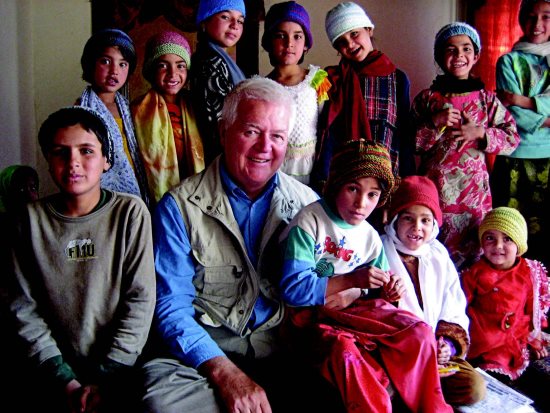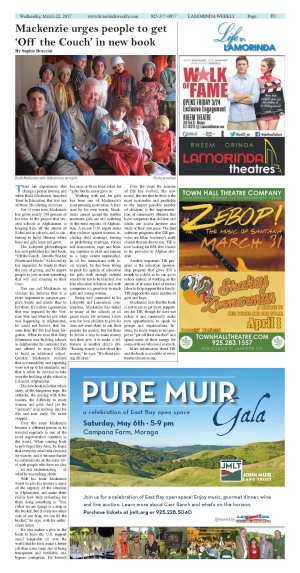| | Published March 22nd, 2017
| Mackenzie urges people to get 'Off the Couch' in new book
| | | By Sophie Braccini |  | | Budd Mackenzie with Afghan boys and girls. Photo provided |
There are experiences that change a person forever, and when Budd Mackenzie launched Trust In Education, that was one of those life-altering decisions.
 For 14 years now, Mackenzie has given nearly 100 percent of his time to the project that created schools in Afghanistan, is keeping kids off the streets of Kabul and in schools, and is continuing to build libraries where boys and girls learn and grow.
For 14 years now, Mackenzie has given nearly 100 percent of his time to the project that created schools in Afghanistan, is keeping kids off the streets of Kabul and in schools, and is continuing to build libraries where boys and girls learn and grow.
 The Lafayette philanthropist has now published his first book, "Off the Couch - Into the War for Hearts and Minds." As his reality has expanded, he wants to share the joys of giving, and to inspire people to join or start something that will add meaning to their lives.
The Lafayette philanthropist has now published his first book, "Off the Couch - Into the War for Hearts and Minds." As his reality has expanded, he wants to share the joys of giving, and to inspire people to join or start something that will add meaning to their lives.
 You can call Mackenzie an idealist. He believes that it is more important to conquer people's hearts and minds than to kill them. He is from a generation that was impacted by the Vietnam War, and when he saw what was happening in Afghanistan, he could not believe that lessons from the 60s had been forgotten. When he read that Greg Mortensen was building schools in Afghanistan he contacted him and offered to raise $30,000 to build an additional school. Quickly Mackenzie realized that accountability and reporting were not up to his standards, and that is when he decided to take over the building of the school in Lalander, Afghanistan.
You can call Mackenzie an idealist. He believes that it is more important to conquer people's hearts and minds than to kill them. He is from a generation that was impacted by the Vietnam War, and when he saw what was happening in Afghanistan, he could not believe that lessons from the 60s had been forgotten. When he read that Greg Mortensen was building schools in Afghanistan he contacted him and offered to raise $30,000 to build an additional school. Quickly Mackenzie realized that accountability and reporting were not up to his standards, and that is when he decided to take over the building of the school in Lalander, Afghanistan.
 The new book tells that whole story, of the dangerous trips, the setbacks, the dealing with tribal leaders, the difficulty to reach women and girls. And yet the "ordinary" man moving into his 60s and now early 70s never stopped.
The new book tells that whole story, of the dangerous trips, the setbacks, the dealing with tribal leaders, the difficulty to reach women and girls. And yet the "ordinary" man moving into his 60s and now early 70s never stopped.
 Over the years Mackenzie became a different person as he traveled regularly to one of the most impoverished countries in the world. When coming back to privileged Bay Area, he found that everyday small talk revealed its vacuity, and it became harder to communicate on the same level with people who have no idea - no real understanding - of what he was talking about.
Over the years Mackenzie became a different person as he traveled regularly to one of the most impoverished countries in the world. When coming back to privileged Bay Area, he found that everyday small talk revealed its vacuity, and it became harder to communicate on the same level with people who have no idea - no real understanding - of what he was talking about.
 With his book Mackenzie wants to give his readers a sense of the urgency of the situation in Afghanistan, and make them realize how truly rewarding for them doing something is. "Yes, (what we are doing) is a drop in the bucket, but if everyone takes care of one drop, we can fill the bucket," he says, with his enthusiasm intact.
With his book Mackenzie wants to give his readers a sense of the urgency of the situation in Afghanistan, and make them realize how truly rewarding for them doing something is. "Yes, (what we are doing) is a drop in the bucket, but if everyone takes care of one drop, we can fill the bucket," he says, with his enthusiasm intact.
 He also makes a plea in the book to have the U.S. support small nonprofits all over the world that he feels make a better job than some large one at being transparent and verifiable, and bypass corruption. He himself has once or twice been asked for "gifts' but he never gave in.
He also makes a plea in the book to have the U.S. support small nonprofits all over the world that he feels make a better job than some large one at being transparent and verifiable, and bypass corruption. He himself has once or twice been asked for "gifts' but he never gave in.
 Working with and for girls has been one of Mackenzie's most pressing motivation. A feminist by his own words, Mackenzie cannot accept the terrible treatment girls are still suffering in the rural regions of Afghanistan. A recent U.N. report states that violence against women, including child marriage, forcing or prohibiting marriage, forced self-immolation, rape and beating continue to exist and remain to a large extent unpunished. In all his interactions with local leaders, he has been trying to push his agenda of education for girls with enough cultural sensitivity not to be rejected. For him education in homes and with computers is a great way to reach girls and young women.
Working with and for girls has been one of Mackenzie's most pressing motivation. A feminist by his own words, Mackenzie cannot accept the terrible treatment girls are still suffering in the rural regions of Afghanistan. A recent U.N. report states that violence against women, including child marriage, forcing or prohibiting marriage, forced self-immolation, rape and beating continue to exist and remain to a large extent unpunished. In all his interactions with local leaders, he has been trying to push his agenda of education for girls with enough cultural sensitivity not to be rejected. For him education in homes and with computers is a great way to reach girls and young women.
 Being well connected to his Lafayette and Lamorinda communities, Mackenzie has talked to many of the schools at all grade levels. He invented a new way for local children to give: he does not want them to ask their parents for money, but for them to devise a way to make money and then give it to make a difference in another child's life. "Raising money is not about the money," he says. "It's about raising children."
Being well connected to his Lafayette and Lamorinda communities, Mackenzie has talked to many of the schools at all grade levels. He invented a new way for local children to give: he does not want them to ask their parents for money, but for them to devise a way to make money and then give it to make a difference in another child's life. "Raising money is not about the money," he says. "It's about raising children."
 Over the years the mission of TIE has evolved. The new model, the one that he feels is the most sustainable and profitable to the largest possible number of children, is the implementation of community libraries that have computers that children and adults can access anytime and study at their own pace. The first software programs that TIE provides are Khan Academy's math classes that are free to use. TIE is now looking for ESL free classes to be provided to Afghan children.
Over the years the mission of TIE has evolved. The new model, the one that he feels is the most sustainable and profitable to the largest possible number of children, is the implementation of community libraries that have computers that children and adults can access anytime and study at their own pace. The first software programs that TIE provides are Khan Academy's math classes that are free to use. TIE is now looking for ESL free classes to be provided to Afghan children.
 Another important TIE program is the education sponsorship program that gives $50 a month to a child so he can go to school instead of working on the streets or at some kind of menial labor to help support their family. TIE supports the same number of girls and boys.
Another important TIE program is the education sponsorship program that gives $50 a month to a child so he can go to school instead of working on the streets or at some kind of menial labor to help support their family. TIE supports the same number of girls and boys.
 Mackenzie adds that the book is not made to get more supporters for TIE, though he does not refuse it and continually seeks new opportunities to speak to groups and organizations. Instead, he really wants to tell people to "get off their couches" and spend some of their energy for some of those who need so much.
Mackenzie adds that the book is not made to get more supporters for TIE, though he does not refuse it and continually seeks new opportunities to speak to groups and organizations. Instead, he really wants to tell people to "get off their couches" and spend some of their energy for some of those who need so much.
 More information about TIE and the book is available at www.trustineducation.org.
More information about TIE and the book is available at www.trustineducation.org.


|
| | | | | | | | | | | | |



